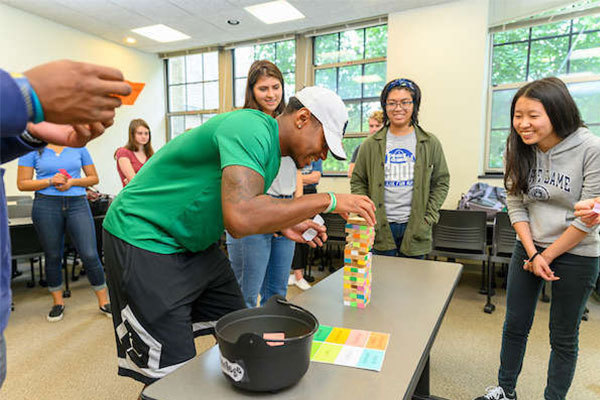

Crime and insanity, archaeology of death, Irish literature, Aristotelian philosophy—all these seemingly unconnected classes are connected by a single department: gender studies.
Senior Juliana Zepf has used her gender studies major to explore the full breadth of the College of Arts and Letters.
Gender is everywhere you look once you simply begin looking for it, says Zepf, and the theoretical framework that she learned in her Introduction to Gender Studies class has been applied throughout her courses in a variety of departments at Notre Dame.
“It factors into everything—power hierarchies, roles people play, burial practices, the way we view mental illness,” Zepf says. “Gender studies is men’s and women’s studies, and it’s everywhere.”
Almost all gender studies classes are cross-listed with other departments, from history to archaeology to philosophy, which Zepf says has allowed her to create her own path centered around her specific interests. Originally planning on a minor in Irish, Zepf says she realized she “was not great at it,” and decided to take gender studies classes within the Irish department.
Courses on women’s voices in Irish literature and on European fairy tales, along with a semester spent studying abroad in Dublin, piqued Juliana’s interest in the niche field of folkloristics. This led to her plan for next year—graduate studies at University College Dublin, where she will be pursuing a masters’ degree in Irish folklore and ethnology.
For her thesis in gender studies, Zepf is examining the definition of rationality in humans by studying the behavior of a completely different species: honeybees. She is drawing from her background in the Program of Liberal Studies (PLS), which takes students through a series of seminars on the history of Western thought, to apply Aristotle’s theory of rationality to honeybees and humans.
“Aristotle is basically the basis for all of Western philosophy,” says Zepf, “and he said that humans are rational, and if you’re not acting rationally, you were not properly performing as a human. That got complicated because then every human being is not equally rational—women, he said, are less rational than men.”
Zepf is looking into the ways in which bees communicate and how their language works. When examining how bees use language and live politically, she asks—what would Aristotle say? Does his rationality framework break down?
Though Zepf loves her PLS major, she says it provides one very specific perspective on human history, which is why she chose to add a gender studies major at the beginning of her first year. She was not aware of the existence of the program until a majors fair, where Associate Director of Gender Studies Pam Butler invited Zepf to join her Introduction to Gender Studies class.
“In PLS, you’re reading through history of Western thought, which is full of old white men,” says Zepf. “That is one distinct perspective. It’s an important perspective, but it’s written for rulers and thinkers, for people who don’t have to cook or do laundry or tasks that normal people have to do.”
Through gender studies, Zepf has been able to create her own curriculum pulling from various departments and programs in the College of Arts and Letters, exploring a path unique to her interests, and creating her own research project for her yearlong thesis. One of her favorite classes explored the incidence of gendered treatment in the criminal justice system and in diagnosing mental illnesses, such as hysteria, throughout American history.
Though not particularly relevant to her personal interests, Zepf adds that the gender studies department has a section of classes each semester examining the intersection of gender and Catholicism, cross-listed with theology courses.
“Gender Studies will pretty much let you study whatever you want,” says Zepf. “If you’re choosing between a bunch of programs in the College of Arts and Letters, I would register for a gender studies class. If you start out with that, you might discover another major to pick up along the way.”

Learn More
-
Explore gender studies at Notre Dame.
- Learn about the Summer Internship Grant for gender studies students.
- See what you can do with a degree in gender studies.
Originally published by at admissions.nd.edu on November 18, 2020.